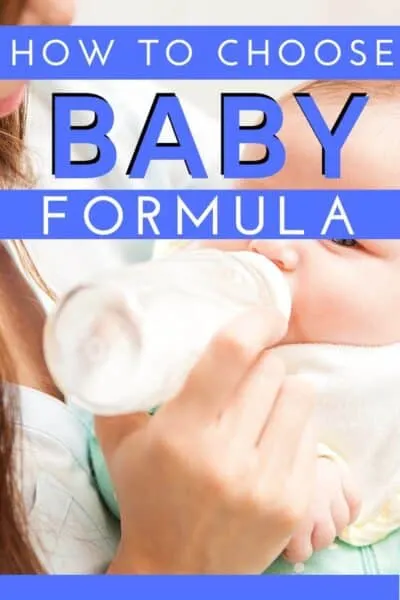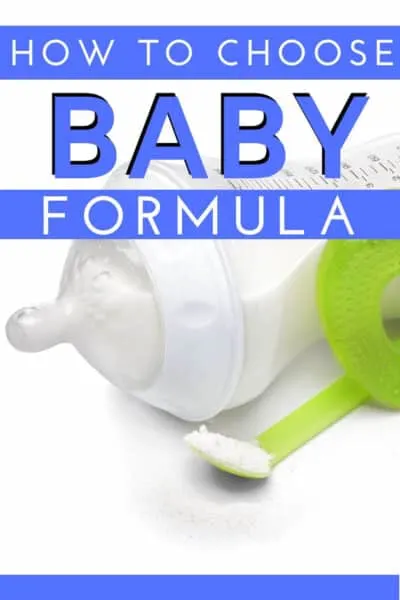Updated August 3, 2022

How to choose the best baby formula for your newborn can feel overwhelming. The store shelves contain many types of formula and many brands.
As a new mom, I remember standing in the aisle at CVS on the verge of a meltdown. Not only was I dealing with the emotional challenge of switching from breastfeeding to bottle-feeding but, I suddenly found myself not knowing where to begin when it came to selecting the best baby formula for my newborn.
There were far too many choices. Add to this, the fact that I was sleep-deprived and the task seemed insurmountable.
In a hurry?
👉 Our readers love and buy this baby formula most often.
I don’t want anyone to have to go through what I did when I decided to switch to bottle-feeding.

This post contains affiliate links. You can read our affiliate disclaimer at the bottom of this post.
So how do you choose the right baby formula?
The first step in choosing the best baby formula is to talk to your pediatrician.
Choosing the right baby formula can be as simple as following the recommendation of your pediatrician.
Below is a list of some of the factors that are known to contribute to the growth and development of your baby:
- Gestational age at the time of delivery
- How your baby tolerates cow’s milk versus soy-based formula
- Possible underlying medical conditions that affect digestion
- If your child is anemic and needs iron.
Listen closely to your pediatrician’s recommendations.
This will help you feel confident that you know the best formula for your newborn.
How To Choose The Best Baby Formula For Your Newborn:
Types of Baby formula:
The two basic types of formula are based on the protein source:
- The standard formula comes from cow’s milk protein (casein protein)
- For baby’s that do not tolerate cow’s milk, soy-based formula.
- For baby’s being placed on a vegetarian-based protein as a result of a parents preference (vegetarian) or for digestive reasons, a soy-based protein can be used, Soy has the necessary nutrients to promote normal growth and development and your baby may tolerate it better initially, even if you plan to switch to casein protein.
They also make a hydrolase protein-based formula which is for babies who are not tolerating cow’s milk or soy milk but don’t quite need a prescription formula.
When you hit the formula aisle in your local Target or Walmart you’ll also see the lactose-free formula and formula for premature and low birth weight babies.
There are also specialized formulas designed for babies with colic or acid reflux, and even organic formula.
Organic versus Non-Organic Milk For Children:
The American Academy of Pediatrics states that there is no research to date showing that organic milk is healthier for children than regular milk.
(For more information visit American Academy of Pediatrics
Eating organic is a personal decision. If you feed your family with an organic diet, you may want to use organic formula.
Certain digestive conditions may require formulas to be broken down to facilitate digestion:
- If your child requires a special baby formula, your pediatrician will be determining what formula is best. These formulas are specially processed to make digestion easier. Proteins are hydrolyzed or broken down if your child’s digestive tract cannot break down proteins so they can be absorbed from the intestines.
- In certain situations, your baby may require a formula that has protein broken down into its smallest building blocks known as amino acids.
Special baby formula is used if your child is not producing the enzymes necessary to break down proteins.
When your baby transitions to solid food, your pediatrician will let you know what solid food (proteins) are easiest for your baby to digest.
What form does the baby formula come in?
Baby formulas come in three forms:
- Powdered Formula
- Concentrated Liquid Formula
- Ready-To-Feed Formula
Powdered formula: Powdered formula is by far the most affordable and least expensive. To make formula you simply mix the powdered formula with water.
Concentrate – liquid formula: Formula that requires you mix equal parts water with formula. It is less expensive than ready to feed formula and easier to work with than powdered formula.
Ready-to-feed formula: The most expensive but also the most convenient type of formula, requires no mixing, no measuring, and no stirring. Furthermore, when your newborn is ready for feeding, it is the easiest to use.
This is the formula used in hospitals. Most important of all is the fact that it avoids the risk of formula contamination.
If you are bottle-feeding, you can buy ready-to-feed formula which can make your life much easier when coming home after your delivery. The first few weeks with a newborn are difficult enough.
Having a baby shower? Consider asking for ready-to-feed formula. If you decide to formula feed after you deliver, any event such as a sip and see can be an opportunity to ask for formula.)
If you are formula feeding and you can afford it, splurge on the ready-to-feed formulas. Don’t feel guilty about spending the money on formula, your recovery and healing are very important.
Formula feeding essentials:
Anything you can do to make life easier and smoother for you and your new baby is OK.
These are a few bottle-feeding items that we and our readers could not do without.
👉 Our readers love and buy this formula maker most often. As one mom told us “Buy this!”
We agree. Formula makers are not a luxury item in 2020. You push one button and have a perfectly blended warm bottle of formula in seconds! Not minutes.
That means less time with a screaming hungry baby at 2 AM and more sleep for you.
[wps_youtube url=”https://youtu.be/KVCJ-If5XSg” width=”600″ height=”400″ responsive=”yes” autoplay=”no”]
Whatever form of formula you choose always practice proper sterilization techniques.
How to Choose The Right Baby Formula:
Deciding which type of formula to buy for your baby depends on a few factors.
One factor which many of us can recall is the well-publicized tragedy involving powdered formulas in countries with contaminated water supplies.
Understandably, the individuals in these countries are going to seek out affordable options for formula.
Consider the following factors when you choose the best baby formula for your newborn:
- The quality of your water supply
- Cost of the formula (affordable)
- The convenience of preparing the formula
- Portability of formula (proper storage and transportation)
- Your access to the supplies necessary to prepare the formula at home or work
Most pediatricians recommend starting with a cow’s milk protein-based formula.
These formulas are easy to digest, assuming your baby has no underlying digestive problems.
Should your baby not tolerate cow milk protein, a soy-based protein is usually the next choice.
Note: My son didn’t tolerate cow’s milk-based formulas. He had a lot of gas and reflux.
My pediatrician switched him over to a soy-based formula and after which he did much better.
We tried several different bottles and nipple types too. Sometimes you have to try a few different strategies to make your little one feel better.
There are several other types of infant formula:
There is a formula with iron for infants with iron deficiency anemia under one year of age.
A baby’s iron deficiency anemia can be the result of increased fetal blood loss at the time of delivery (abruption) or impaired iron absorption may need to be sorted out through further testing, especially if the baby’s iron deficiency persists.
If your baby does not tolerate milk or soy-based formula, your baby’s pediatrician will test for a digestive disorder. Fortunately, these disorders are often self-limited or treatable.
This can range from an enzyme deficiency to a mechanical problem such as pyloric stenosis.
What is pyloric stenosis?
Though pyloric stenosis is not a digestive disorder due to an enzyme deficiency or allergic intolerance, it is a good idea to spend a moment discussing this condition because it can manifest like an allergic intolerance to baby formula. It is, most common in males.
Pyloric stenosis occurs when there is a narrowing at the pyloric sphincter.
This is where the stomach enters the small intestine. The symptom associated with pyloric stenosis is called “projectile vomiting”.
A work-up for formula intolerance may reveal this problem and often before your baby is discharged home.
The diagnosis can be delayed if the obstruction is not severe. Fortunately, once diagnosed, pyloric stenosis can be corrected surgically.
 (Pyloric stenosis is a narrowing of the opening from the stomach to the 1st part of the small intestine (pylorus).
(Pyloric stenosis is a narrowing of the opening from the stomach to the 1st part of the small intestine (pylorus).
Image: Wikipedia
Why can’t my newborn drink cow’s milk?
Many new parents ask: “Why can’t my baby have regular cow’s milk?”
- Cow’s milk is not been properly broken down for use in baby formula. It is too high in protein for a newborn’s immature digestive system.
- Cow’s milk protein can stress your baby’s kidneys
- It can cause diarrhea resulting in dehydration.
- Doesn’t have enough iron in it for infants and may cause iron deficiency anemia in some babies.
Please note the list above is why you do not give a newborn baby cow’s milk in place of formula if you are bottle-feeding:
The American Academy of Pediatrics recommends that you should not feed ANY type of cow’s milk to your infant until 12 months of age.
Once your baby is 12 months old, you can gradually introduce cow’s milk along with other solids. For more information about this, visit: The American Academy of Pediatrics
Conclusion
We hope that this article will answer many of the questions you have about baby formula.
Whether one starts with bottle-feeding or breastfeeding, it is not surprising there are many questions about baby formula.
Asking how to choose the best baby formula for your newborn is a common question new parents have.
Affordability can factor into what form of formula you select (powder, concentrate, or ready-made).
Ready-made is easiest. But no matter what form of formula you choose, always follow the directions on the container when preparing.
What to read next:
- The 5 Best Crib Reviews For 2019
- 7 Brilliant Baby Hacks Every New Mom Should Know
- 11 Common Baby Rashes: A New Mom’s Quick Guide





